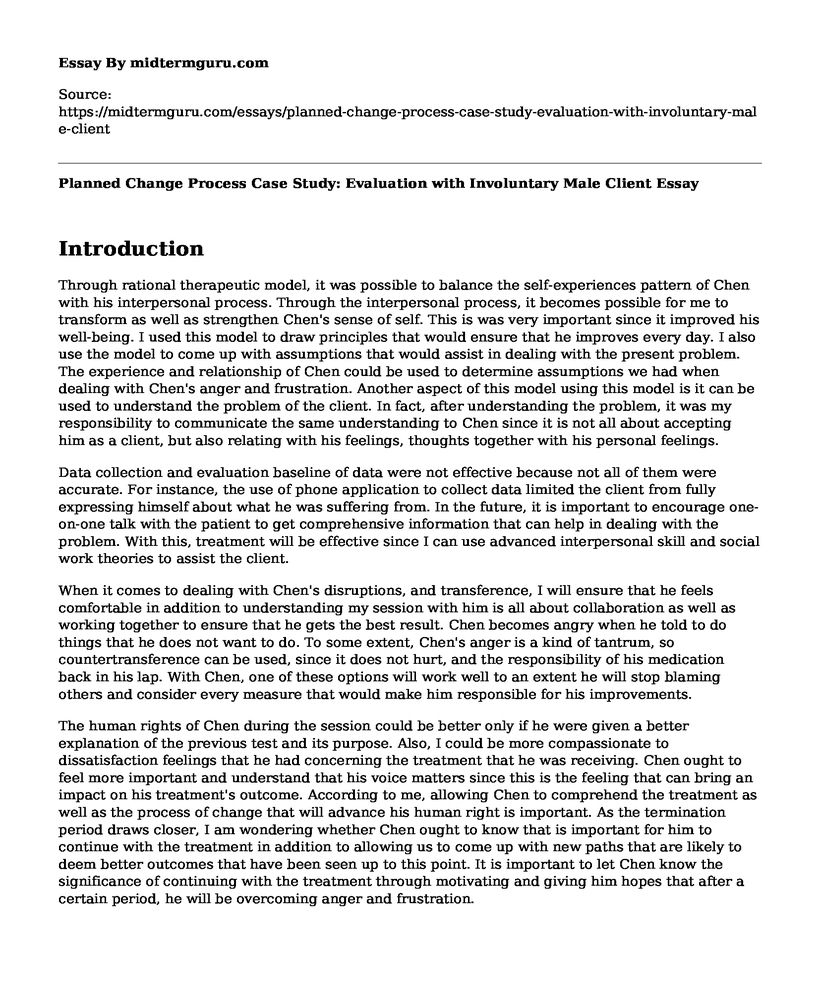Introduction
Through rational therapeutic model, it was possible to balance the self-experiences pattern of Chen with his interpersonal process. Through the interpersonal process, it becomes possible for me to transform as well as strengthen Chen's sense of self. This is was very important since it improved his well-being. I used this model to draw principles that would ensure that he improves every day. I also use the model to come up with assumptions that would assist in dealing with the present problem. The experience and relationship of Chen could be used to determine assumptions we had when dealing with Chen's anger and frustration. Another aspect of this model using this model is it can be used to understand the problem of the client. In fact, after understanding the problem, it was my responsibility to communicate the same understanding to Chen since it is not all about accepting him as a client, but also relating with his feelings, thoughts together with his personal feelings.
Data collection and evaluation baseline of data were not effective because not all of them were accurate. For instance, the use of phone application to collect data limited the client from fully expressing himself about what he was suffering from. In the future, it is important to encourage one-on-one talk with the patient to get comprehensive information that can help in dealing with the problem. With this, treatment will be effective since I can use advanced interpersonal skill and social work theories to assist the client.
When it comes to dealing with Chen's disruptions, and transference, I will ensure that he feels comfortable in addition to understanding my session with him is all about collaboration as well as working together to ensure that he gets the best result. Chen becomes angry when he told to do things that he does not want to do. To some extent, Chen's anger is a kind of tantrum, so countertransference can be used, since it does not hurt, and the responsibility of his medication back in his lap. With Chen, one of these options will work well to an extent he will stop blaming others and consider every measure that would make him responsible for his improvements.
The human rights of Chen during the session could be better only if he were given a better explanation of the previous test and its purpose. Also, I could be more compassionate to dissatisfaction feelings that he had concerning the treatment that he was receiving. Chen ought to feel more important and understand that his voice matters since this is the feeling that can bring an impact on his treatment's outcome. According to me, allowing Chen to comprehend the treatment as well as the process of change that will advance his human right is important. As the termination period draws closer, I am wondering whether Chen ought to know that is important for him to continue with the treatment in addition to allowing us to come up with new paths that are likely to deem better outcomes that have been seen up to this point. It is important to let Chen know the significance of continuing with the treatment through motivating and giving him hopes that after a certain period, he will be overcoming anger and frustration.
Cite this page
Planned Change Process Case Study: Evaluation with Involuntary Male Client. (2022, Aug 31). Retrieved from https://midtermguru.com/essays/planned-change-process-case-study-evaluation-with-involuntary-male-client
If you are the original author of this essay and no longer wish to have it published on the midtermguru.com website, please click below to request its removal:
- Childhood Trauma - Paper Example
- Paper Example on Creating Interventions for a Trauma and Abuse Child
- Isolation the Elderly Research Paper
- Paper Example on Internet and Digital Technologies' Effects on Mental Health
- Buchanan Unites Conservatives on Moral Issues in Bush Speech - Essay Sample
- Fear/Afraid - Essay Sample
- Depression: A Severe Medical Illness With Treatments Available - Essay Sample







